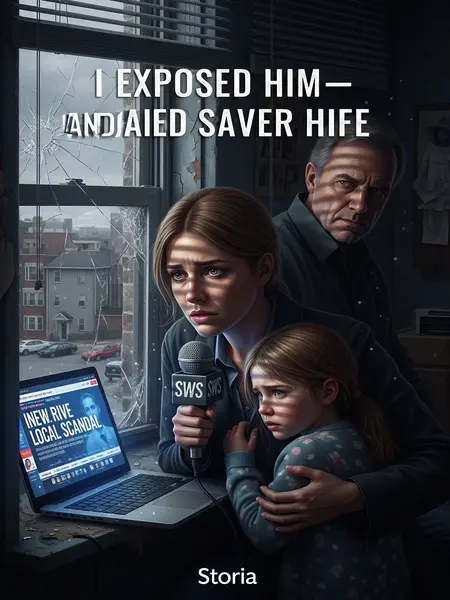Chapter 4: Autumn’s Last Wish
"Let’s go in and take a look," the cameraman said, seeing my worry. He turned on his gear and led the way.
I followed, nerves jangling. But after a few steps, he stopped cold. I craned my neck, trying to see. Dennis Carter was lying on the floor by the bed, clutching a corner of the quilt.
His face was ashen, lips tinged blue. For a moment, the room felt frozen in time. He wasn’t moving.
"Don’t look—call 911 now."
The cameraman snapped to action. I fumbled for my phone, hands shaking so hard I almost dropped it. My voice cracked as I gave the address. The operator’s calm voice was the only thing tethering me to reality. My heart hammered in my chest, sweat slicking my palms.
Through it all, the girl acted as if she were asleep, never opening her eyes.
Her breathing was shallow, her body still. Was she in shock? Or just too used to chaos to care?
After calling 911, I walked to the bed and gently touched her shoulder. Nothing. I put my hand under her nose. Relief flooded me—she was still breathing.
But the unease didn’t fade. If anything, it grew stronger.
Dennis was hiding something. Maybe a lot of things.
The ambulance came fast. Paramedics moved with practiced efficiency, checking vitals, asking questions. The girl was wrapped in a faded blanket, eyes fluttering open for a second before closing again.
First, Dennis—after examination, the doctors said he’d fallen into a coma from hypoglycemia.
Luckily, they got to him in time. Any longer and he’d have suffered brain damage, maybe ended up in a permanent coma.
"Doctor, why did Dennis go into a coma from low blood sugar? Isn’t that pretty rare for most people?"
Out of habit, I pressed for answers.
"If a person’s pancreas works normally, it’s nearly impossible to end up in a coma from hypoglycemia. But Dennis has type 1 diabetes—he’s on insulin. For diabetics, this kind of thing happens more than you’d think."
"How come?"
"Type 1 diabetics have no pancreatic function, so they depend on insulin shots. If they inject too much, and don’t catch the low blood sugar early, it can lead to a coma. But something about Dennis’s case is odd."
The doctor glanced at the camera, hesitating.
"It’s okay, just consider this off the record."
He nodded.
"We ran a full panel on Dennis. His HbA1c was 13.1. Normal’s around 4.8. Only really uncontrolled diabetics get numbers that high. For someone like Dennis to end up in a coma from hypoglycemia, his blood sugar would have to drop to the 30s. But if he usually runs that high, why the sudden crash?"
I didn’t have an answer. But there had to be a reason—one I’d only find out when Dennis woke up.
The girl’s exam threw me even more.
"What about the girl? The little girl who came in with Dennis."
"According to her bone scans, she’s sixteen or seventeen. But she looks like a ten-year-old."
My jaw dropped. I couldn’t believe it—the girl with limbs like sticks and a face the size of my fist was a teenager?
That can’t be right. If she was that old, she should’ve started her period years ago, right? Why did Dennis ask me about it just yesterday?
I was replaying every word Dennis had said, when the doctor continued, seeing my confusion.
"She’s also severely anemic, missing a bunch of trace elements, with some organ issues. She’s extremely malnourished. I think there’s more going on."
"She has scleroderma and was just hospitalized here. Can you pull her records?"
I remembered Dennis’s livestream—he’d said St. Vincent’s, scleroderma, hospitalization.
"Scleroderma? If that’s really her diagnosis, why are they still living here? People with scleroderma do better in warm climates. They should be down south. I’ll check her records, but no promises."
He left. I sat there, grateful I hadn’t just written the sob story. There was more here. Way more.
Dennis had raised nearly $100,000 online. Even if treatment was expensive, they should’ve had enough for food, especially with Medicaid. So why was the girl starving?
And Dennis only started streaming last year, meaning the girl’s illness was less than two years old. Scleroderma isn’t usually that fast.
Why was she already in organ failure?
If they had the money, why hadn’t they moved south, somewhere warm?
One question after another. A terrifying idea started to form in my mind.
Did Dennis steal the money?
But if so, why was his family still so poor?
Could it be…
With that gnawing doubt, I handled the hospital paperwork and sent the cameraman home. I needed answers, and I needed them now.
I went back to Dennis’s building. The place was even more run-down than I remembered—walls covered in faded flyers, the air thick with old smoke and grease. I pulled my jacket tighter, shivering despite the heat.













